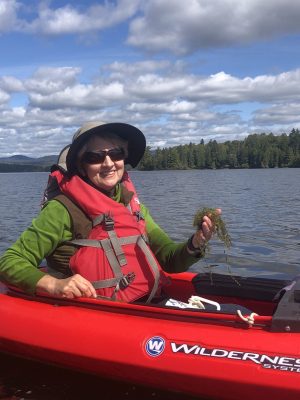
RANGELEY – Once again, Rangeley Lakes Heritage Trust’s volunteer invasive plant patrollers have found no aquatic invaders during their annual surveys and a massive thank you goes out to them.
Volunteers patrol in July, August, and September (when peak growth) to survey shorelines and document native plants. Fourteen lakes and ponds surveyed were: Beaver Mountain, Cupsuptic (including the Cupsuptic River), Kennebago, Little Kennebago, Loon, Mooselookmeguntic, Rangeley, and Saddleback lakes, and Gull, Haley, Dodge, and Quimby ponds.
New survey areas added this year were Round and Middle Sandy River Ponds.
Early detection is key to successfully eradicating any new infestations that may occur. In performing these surveys annually, volunteers can recognize what usually grows in their lake and make it easier to observe trends and spot potential invasive plants, which provides a crucial first line of defense.
The Rangeley Lakes region (and most of Maine) has an overwhelming need for volunteers to help protect our unique natural areas. Outdoor recreation is more popular than ever, and people travel more quickly than in the past. Aquatic plants and animals travel with us on shoes, fishing poles, boats, and other gear.
“Community involvement is crucial to protecting our lakes and ponds. Volunteers can paddle their local waterbody with friends and family, making it an annual tradition. Passing on the torch of lake stewardship to the next generation is essential in preserving the beauty and ecological health of our watersheds for years to come,” said Hanz Berger, Americorps environmental steward, and RLHT’s current headwaters program coordinator.
If you are interested in becoming an invasive plant patroller, you can go through the Lake Stewards of Maine. Participants watch a three-part video series, pass the corresponding quizzes, and return a certification form. During the patrolling season, surveys are sent in via an app, making the process remote and safe from start to finish.
With cold weather fast approaching, it’s a great time to get certified and be ready to hit the water paddling next July.
To learn more, contact Berger at headwaters@rlht.org or visit rlht.org. For more information on your specific region, go to lakestewardsofmaine.org.




